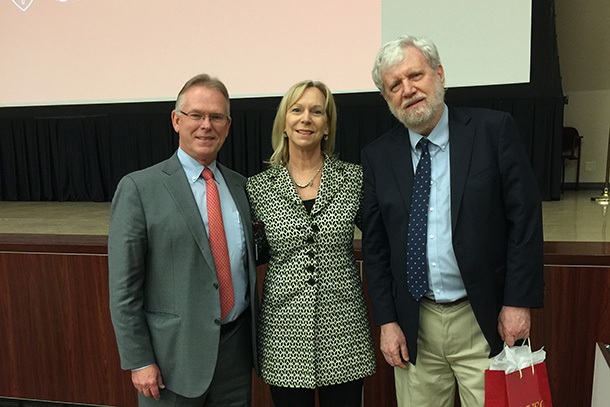Anders Ericsson, PhD, Conradi Eminent Scholar and Professor of Psychology at Florida State University, has spent his career studying how people from musicians to chess champions to athletes achieve superior performance in their chosen fields. His most recent book, Peak: Secrets from the New Science of Expertise explores the vital role of “deliberate practice” — not merely putting in hours of repetition, but making sure to stretch beyond one’s current skill level.
When Ericsson met Maura Sullivan, PhD, MSN, professor of clinical surgery (educational scholar), associate dean of simulation education in health sciences and executive director of the Surgical Skills Simulation and Education Program, she told him about the Keck School of Medicine of USC’s surgical training. Ericsson was immediately intrigued.
“Surgery is an interesting counterpoint to Ericsson’s studies,” Sullivan explained. “A violinist or a basketball player will study or practice for dozens of hours in preparation for an hour or two of performance. With a surgeon, that ratio is different. Unless you’re doing a simulation, there’s a live patient involved — it’s almost all performance.”
Ericsson arrived at Keck Medicine of USC on April 11 and spent two days shadowing Department of Surgery Chair Vaughn A. Starnes, MD, Distinguished Professor of Surgery and H. Russell Smith Foundation Chair for Stem Cell and Cardiovascular Thoracic Research. Ericsson was particularly interested in Starnes because most surgeons — and most experts — only reach superior performance in one area of training. Starnes, however, has achieved exceptionally high performance in two distinct disciplines: adult cardiac surgery and congenital surgery. After watching Starnes at work, Ericsson said he was impressed by the way Starnes approaches his surgeries.
“Even at his advanced level of expertise, he keeps thinking about what he could be doing better,” Ericsson said. Ericsson also admitted to being intrigued by Starnes’s 6 handicap in golf: “If you already apply the principles of deliberate practice in your work, you can apply them anywhere.”
Ericsson gave surgical grand rounds on April 13 and spoke about surgical expertise and how to keep improving on it. When asked how his techniques could be put to use at the Keck School, Ericsson was enthusiastic about the possibilities of technology to open new ways for surgeons to practice in preparation for performance. He also emphasized the importance of mentorship, both in showing proper technique and in giving frequent, honest feedback to help students have a clear understanding of their skill level and how to improve.
Overall, Ericsson said his work offers hope for anyone with a skill — work or play — that they truly want to develop or improve. Not everyone can be a superior performer, but with deliberate practice, everyone can be better, he said.
— Lex Davis


